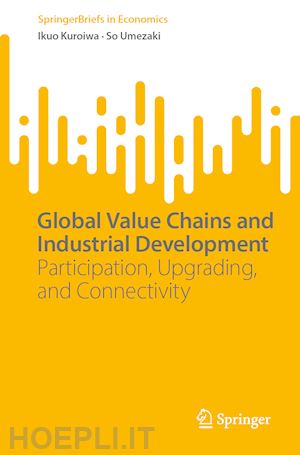
Questo prodotto usufruisce delle SPEDIZIONI GRATIS
selezionando l'opzione Corriere Veloce in fase di ordine.
Pagabile anche con Carta della cultura giovani e del merito, 18App Bonus Cultura e Carta del Docente
This book aims to investigate the global value chain (GVC) from a viewpoint of industrial development and examine how GVC participation, upgrading, and connectivity have affected structural transformation in developing economies. It first reviews the indexes to measure progresses in GVC participation and upgrading. Then it examines factors affecting these progresses, using original measures of connectivity, which are computed based on the complex network theory. Another distinguished feature of the study is its in-depth analyses on the relationship between economic development and GVC participation based on the hypothesis of nonlinear relationship which is drawn from authors past studies on Asian economies. Major findings include (1) inverted-U shaped relationship between backward participation and income levels, (2) U shaped relationship between forward participation and income level, (3) marginal but significant impacts of maritime and aviation connectivity on GVC participation, (4) significant and different roles of basic and advanced education on the upgrading in GVCs, and (5) the importance of technological intensities in export in sustaining economic growth.
Chapter 1 Introduction.- Chapter 2 GVC participation and trade.- Chapter 3 Upgrading in GVCs.- Chapter 4 Measuring connectivity in global maritime and aviation networks.- Chapter 5 Technological intensities of exports in East Asia.
Ikuo Kuroiwa is Professor at Faculty of International Economic Studies, University of Niigata Prefecture (UNP), specialized in regional economics and East Asian economies with particular emphasis on economic integration and the formation of production networks in this region. Before he joined UNP, he had been working for Institute of Developing Economies (IDE-JETRO) for more than 30 years. While he was a researcher at IDE-JETRO, he was posted to the US, Indonesia, Singapore, and Thailand to conduct research on East Asian economies. In recent years, however, he has expanded his scope of analysis and conducted research on GVCs in Africa and other developing regions.
During his long carrier as a researcher, he has edited several books on production networks and industrial clusters in East Asia, which include The Location of Industries in Newly Integrated East Asian Economies: New Economic Geography Perspective, New York: Palgrave-Macmillan, 2011; and Production Networks and Industrial Clusters: Integrating Economies in East Asia, Singapore: Institute of Southeast Asian Studies (ISEAS), 2008. He is also the author of refereed papers, such as “Agglomeration economies in Vietnam.” Journal of Asian Economics, 62, June 2019; and ”Value Content and Production Networks in Southeast Asia: Application of AFTA and ASEAN Plus One FTA Formulas.” The Developing Economies, 47(2), 2009.
During his temporary assignment to the Economic Research Institute for ASEAN and East Asia (ERIA) in Jakarta, Indonesia between 2008 and 2011, he contributed several flagship projects related to the economic integration in ASEAN and neighboring countries such as the Comprehensive Asia Development Plan (CADP), ASEAN-India Connectivity, the ASEAN Strategic Transport Plan (ASTP), and the Masterplan on ASEAN Connectivity (MPAC).
He has published articles on Southeast Asian economies in refereed journals for example “The Malaysian Economy after the Global Financial Crisis: International Capital Flows, Exchange Rates, and Policy Responses”, Public Policy Review, 15(1), pp.69-98, July 2019; “Five Growth Strategies for Myanmar: Re-engagement with the Global Economy”(co-authored with T. Kudo and S. Kumagai), Journal of Southeast Asian Economies, 31(2), pp.173-194, August 2014; and “Monetary Policy in a Small Open Economy: The Case of Malaysia”, The Developing Economies, 45(4),pp.437-464, December 2007.











Il sito utilizza cookie ed altri strumenti di tracciamento che raccolgono informazioni dal dispositivo dell’utente. Oltre ai cookie tecnici ed analitici aggregati, strettamente necessari per il funzionamento di questo sito web, previo consenso dell’utente possono essere installati cookie di profilazione e marketing e cookie dei social media. Cliccando su “Accetto tutti i cookie” saranno attivate tutte le categorie di cookie. Per accettare solo deterninate categorie di cookie, cliccare invece su “Impostazioni cookie”. Chiudendo il banner o continuando a navigare saranno installati solo cookie tecnici. Per maggiori dettagli, consultare la Cookie Policy.